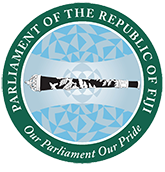The Constitution of the Republic of Fiji establishes Fiji’s system of government. It provides for three separate arms of the State – the Legislature (or Parliament), the Executive, and Judiciary.
Parliament
Elected by the people of Fiji, Parliament is the legislative branch of the State. Parliament makes laws, represents the community in discussions about issues that affect them, investigates issues of importance to the community and scrutinises the actions of government.
Parliament has 56 Members – 55 Members are elected and 1 is a non-elected Member. The 55 Members can either belong to a political party or be elected as independent members. Most Members belong to a political party.
Parliament’s proceedings are chaired by an independent Speaker who is not a Member of Parliament.
Members from the political party with the majority of seats in Parliament form the Government. The party/parties which are not part of the Government form the Opposition.
Executive
The Executive is the administrative arm of government and is responsible for putting into operation the laws passed by Parliament and administering the programs and services that are delivered by Government.
Executive authority is vested in the President, who acts on the advice of the elected Government.
The Government is formed by the Members of Parliament from the political party with a majority of members in Parliament. Governments must have the confidence of the Parliament as in practice it is the Government that puts forward the majority of legislation to Parliament.
The leader of the political party with a majority of members of Parliament becomes the Prime Minister, who is the head of the Government.
The Cabinet is the decision-making body of the Government and is chaired by the Prime Minister. Cabinet comprises Ministers appointed by the Prime Minister from among the members of Parliament who belong to the Government party.
Ministers are responsible for administering specific areas of government activity, known as portfolios. They are responsible to the Parliament for the way in which they exercise their powers and administer their functions.
Judiciary
The Judiciary is the legal branch of government and is responsible for interpreting and enforcing the laws of Fiji.
Judicial power and authority is exercised by the courts – the Supreme Court, the Court of Appeal, the High Court, the Magistrates Court and other courts and tribunals that may be created by law.
The courts are independent of Parliament and the Executive.



